2017 SkS Weekly Climate Change & Global Warming Digest #43
Posted on 29 October 2017 by John Hartz
SkS Highlights... Story of the Week... Toon of the Week... Quote of the Week... Graphic of the Week... SkS in the News... SkS Spotlights... Coming Soon on SkS... Poster of the Week... Climate Feedback Reviews... SkS Week in Review... 97 Hours of Consensus...
SkS Highlights...
"A new Denial101x course launched on Oct. 24 and will be running for the next 7 weeks. Sadly, this course is more relevant and topical than ever." - John Cook
What you'll learn:
- How to recognise the social and psychological drivers of climate science denial
- How to better understand climate change: the evidence that it is happening, that humans are causing it and the potential impacts
- How to identify the techniques and fallacies that climate myths employ to distort climate science
- How to effectively debunk climate misinformation
Click here to enroll in the timely and informative Denial 101x course.
Story of the Week...
Are Antarctica's Ice Sheets Near a Climate Tipping Point?
Nearly all coal emissions need to stop by 2050 to avoid accelerating ice loss that could lead to 4 feet of sea level rise this century, scientists say.
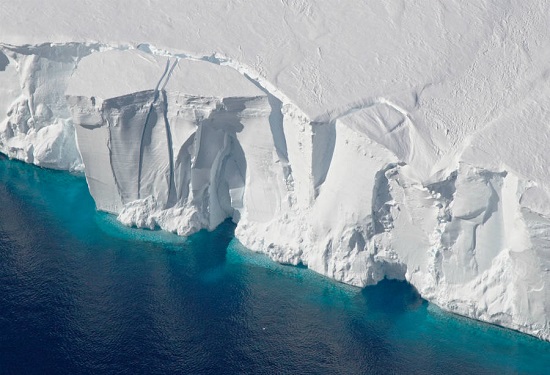
“Parts of the West Antarctic Ice Sheet appear to already be in substantial decline. If that continues, it’s not a matter of how much, but how fast sea level will rise,” climate physicist Carl-Friedrich Schleussner said. Credit: Jeremy Harbeck/NASA
The world needs to eliminate nearly all carbon dioxide emissions from coal burning by 2050 to avoid pushing Antarctica's ice sheets past a tipping point that could cause a major surge in sea level rise, new research shows.
If CO2 emissions from fossil fuels continue at their present pace, many Pacific islands and millions of people along low-lying shores like the U.S. Gulf Coast and the Bay of Bengal could be swamped by 1.3 meters (more than 4 feet) of sea level rise before the end of this century, an international team of scientists found in a new study published today in the journal Environmental Research Letters.
The researchers said their work supports evidence that global warming of more than 1.9 degrees Celsius could push parts of the West Antarctic Ice Sheet past a melting threshold that would rapidly increase the pace of sea level rise.
"What we are increasingly seeing is that we have been on the conservative side in estimating sea level rise," said study co-author Carl-Friedrich Schleussner, a climate physicist at Climate Analytics, a climate science and policy institute. "Parts of the West Antarctic Ice Sheet appear to already be in substantial decline. If that continues, it's not a matter of how much, but how fast sea level will rise."
Are Antarctica's Ice Sheets Near a Climate Tipping Point? by Bob Berwyn, InsideClimate News, Oct 26, 2017
Toon of the Week...
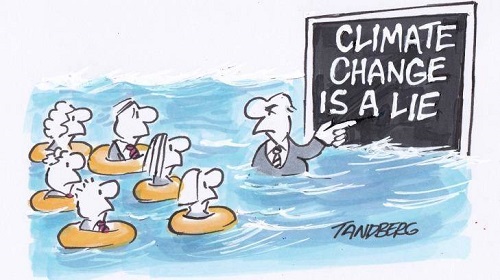
Quote of the Week...
The world will be in deep trouble if it fails to tackle climate change and inequality, IMF managing director Christine Lagarde has warned.
“If we don’t address these issues... we will be moving to a dark future” in 50 years, she told a major economic conference in the Saudi capital Riyadh on Tuesday.
Lagarde said that “we will be toasted, roasted and grilled” if the world fails to take “critical decisions” on climate change.
We will be toasted, roasted and grilled': IMF chief sounds climate change warning, Agence France-Presse (AFP), Guardian, Oct 25, 2017
Graphic of the Week...
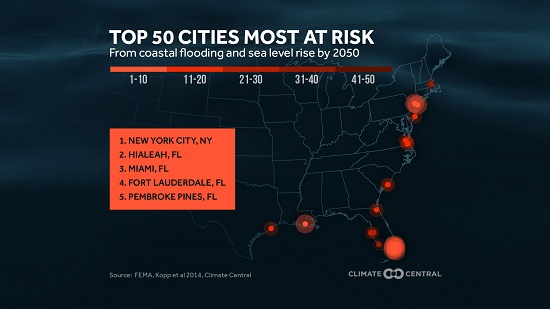
Download high resolution versions.
Five years ago this month, Sandy made landfall in New Jersey as it transitioned to a non-tropical storm. The catastrophic flooding that followed resulted in an estimated $50+ billion in damage. On the storm’s fifth anniversary, we analyze the 50 largest U.S. populations at risk from coastal flooding from Atlantic basin storms.
The number of people at risk in a particular location was calculated by considering locations within FEMA’s 100-year coastal floodplains, which factor in storm surge, tides and waves. Our risk analysis adds sea level rise to these elements and applies the result to coastal cities with populations greater than 20,000. Based on these criteria, coastal cities were ranked by various factors.
New York City was ranked first for current exposure, with over 244,000 people at risk. Numerous communities in South Florida also neared the top of the analysis. Cities were ranked again based on floodplain growth by 2050 given sea level rise under the business as usual (RCP 8.5) emissions scenario, which assumes unchecked greenhouse gas emissions. After accounting for these projections, New York City still had the greatest number of people at risk, with the South Florida community of Hialeah moving into second place on the list.
The analysis assumed no change in population between now and 2050, but still indicated a growing number of people at risk as seas rise. Outside of New York and Florida, Boston was one of the five cities with the greatest increase of population at risk. Across the top five cities, sea level rise places an additional 450,000 people at risk by 2050.
Coastal Cities at Risk, Climate Central, Oct Oct 25, 2017
SkS in the News...
In his Vox Energy & Environment article, Even climate deniers seem to think Scott Pruitt is bullshitting, David Roberts wrote:
Along with being one of the last, stalwart defenders of alcohol and tobacco, Heartland has carried the sputtering torch of climate denial through the long, dark Obama years. Much has changed in the past two decades, in politics and in science, but for the most part, the arguments of the hardcore climate deniers have not. It was “actually, CO2 is good” in 1998 ... and that’s what it is today. (For a rebuttal of this age-old talking point, see Skeptical Science.)
The SkS rebuttal article linked to in the above is Plants cannot live on CO2 alone.
Denial101x gets a nice shoutout at the end of UCS Publishes Industry’s Anti-ScienceDisinformation Playbook by Climate Denier Roundup (Climate Nexus) posted on Daily Kos:
Fortunately, these tactics are similar enough that they can be addressed with the same sorts of responses. If you’re hungry to learn more about what the playbook for countering disinformation, then you’ll be happy to hear that the Skeptical Science crew’s “Making Sense of Climate Science Denial” free online course has started back up. Given the sad fact that “The Fix” portion of the Disinformation Playbook is about the closest the Trump administration has come to any sort of governing philosophy, there should be plenty of easy examples for the course to cover.
While most reporters have learned the hard way that the Disinformation Playbook is probably the only book Trump’s actually read, and one that Pruitt knows by heart, maybe this course could be part of journalism school in the Trump era.
SkS Spotlights...

The Climate Investigations Center (CIC) was established in 2014 to monitor the individuals, corporations, trade associations, political organizations and front groups who work to delay the implementation of sound energy and environmental policies that are necessary in the face of ongoing climate crisis.
The issues the CIC team monitors include:
- Efforts to stall the climate policy process by the fossil fuel industry and its allies
- Climate science denial campaigns spawned by industrial interests and their front groups
- The latest climate science impacts assessments and backlash against them
- Attribution science advances connecting climate impacts to global warming pollution
Coming Soon on SkS...
- New data shows we could still meet the Paris climate targets (Dana)
- The F13 files, part 4 (Ari)
- Guest Post (John Abraham)
- Why people around the world fear climate change more than Americans do (Gregory Carbone)
- New research this week (Ari)
- 2017 SkS Weekly Climate Change & Global Warming News Roundup #44 (John Hartz)
- 2017 SkS Weekly Climate Change & Global Waming Digest #44 (John Hartz)
Poster of the Week...
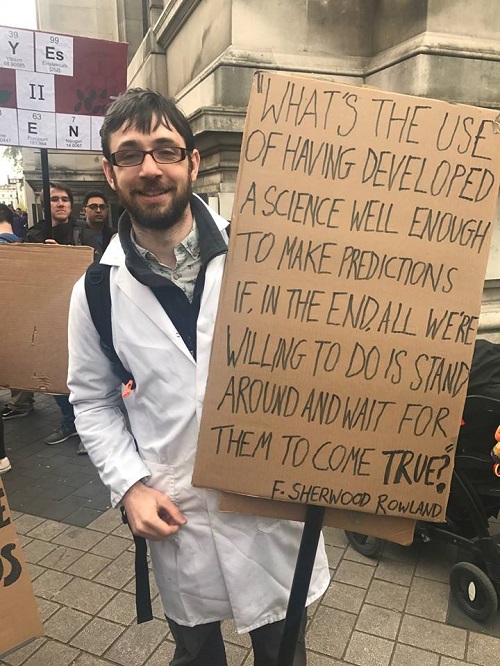
Climate Feedback Reviews...
Climate Feedback asked its network of scientists to review the article, Analysis of "More acidic oceans 'will affect all sea life'" by Roger Harrabin, BBC News, Oct 23, 2017.
Three scientists analyzed the article and estimate its overall scientific credibility to be 'high'.
A majority of reviewers tagged the article as: Accurate.
Review Summary
This BBC article describes an as-yet-unreleased report on ocean acidification from a major collaborative scientific project called BIOACID. The report will summarize the state of research on the impacts of ocean acidification—the changing pH and chemistry of seawater due to rising atmospheric carbon dioxide—on marine life.
Scientists who reviewed the article found that it was generally accurate in its description of the forthcoming report’s overall conclusions that ocean acidification poses an important threat to marine ecosystems. However, the BIOACID report will cover a broad and complex field of research, very little of which is explained in this short article.
BBC article on ocean acidification report accurate but brief, Climate Feedback, Oct 25, 2017
SkS Week in Review...
- 2017 SkS Weekly Climate Change & Global Warming News Roundup #43 by John Hartz
- Interpreting the Paris Agreement’s 1.5C temperature limit by Joeri Rogelj(Carbon Brief)
- New research, October 16-22, 2017 by Ari Jokimäki
- What does a sexist Google engineer teach us about women in science? by John Abraham (Climate Consenus - the 97%, Guardian)
- The F13 files, part 3 - the reference list analysis and other problems by Ari Jokimäki
- Americans want a tax on carbon pollution, but how to get one? by Dana Nuccitelli (Climate Consenus - the 97%, Guardian)
- 2017 SkS Weekly Climate Change & Global Warming Digest #42 by John Hartz
97 Hours of Consensus...
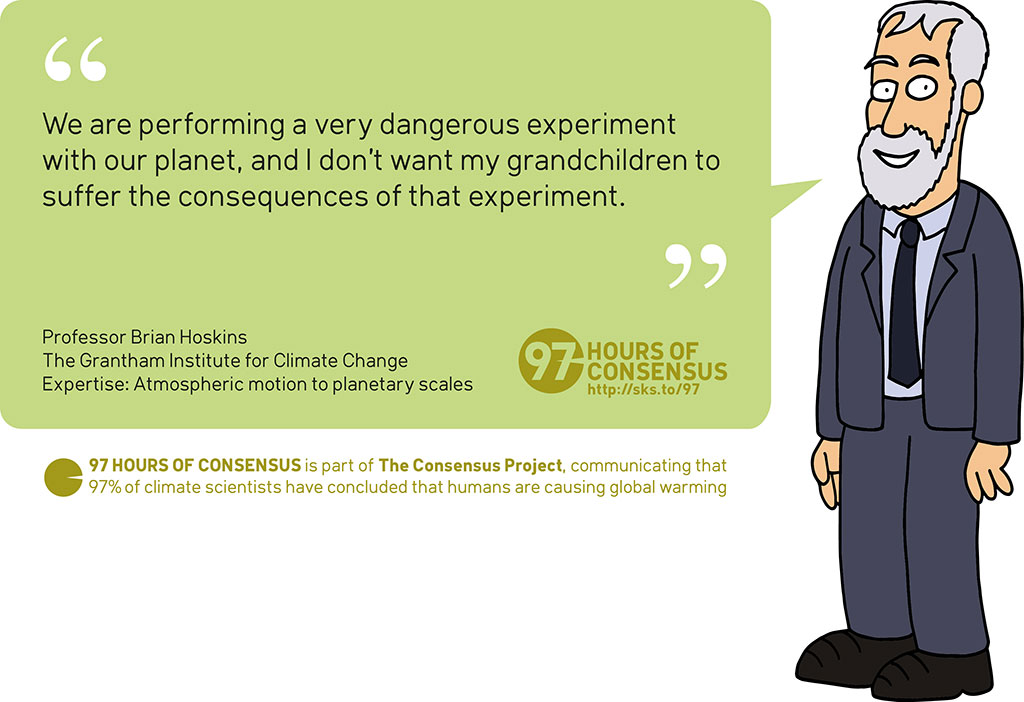































 Arguments
Arguments






























why can’t david attenborough bring himself to say climate change or global warming? he will mention human activity but that’s about it.
David Attenborough talks specifically about climate change here.
www.bbc.com/news/av/science-environment-15994284/sir-david-attenborough-issues-climate-change-warning
unearthed.greenpeace.org/2017/09/25/david-attenborough-climate-change-science-storytelling-blue-planet-ii/